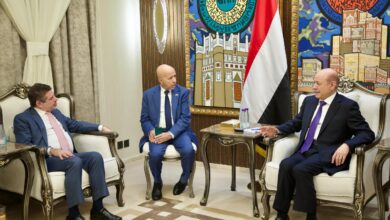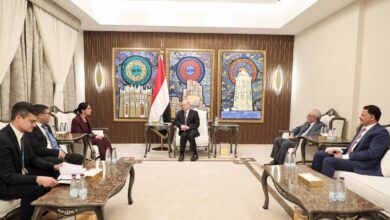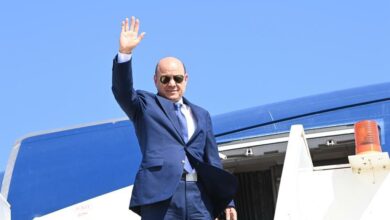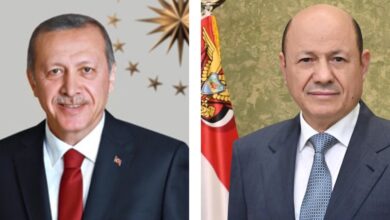Leadership Council head and member Tariq Saleh meet with governors of flood-affected provinces.
Yemen Leadership Addresses Flood Aftermath in Coastal Regions
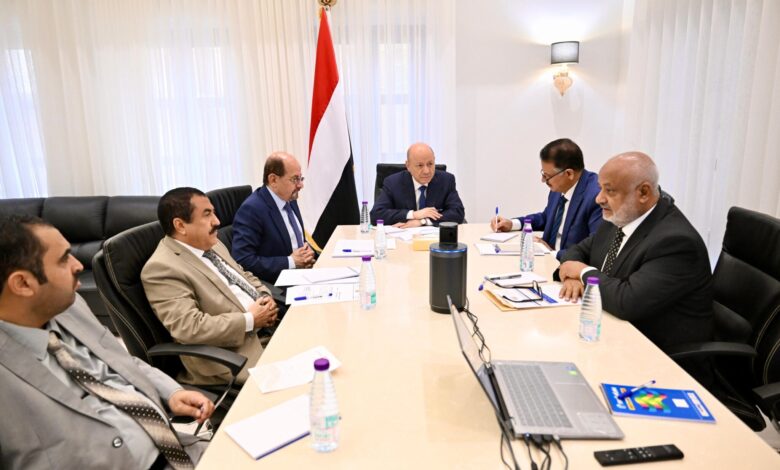
In a significant move, President Dr. Rashad Mohammed Al-Alimi, head of the Presidential Leadership Council, along with council member Tareq Saleh, convened a meeting on Sunday with the governors of the western coastal provinces affected by recent floods and torrential rains. The gathering, which also saw the participation of Foreign Affairs and Expatriates Minister Dr. Shaye Al-Zindani, aimed to assess the latest developments in relief efforts across the impacted regions.
Devastating Impact of Natural Disasters
The meeting delved into the dire situation in the provinces of Taiz, Hajjah, and Hodeidah, which have been severely hit by heavy rainfall and resulting floods. These natural disasters have claimed dozens of lives and caused substantial damage to both public and private properties. Brigadier Tareq Saleh presented a brief report on the current state of the catastrophe, highlighting the local relief efforts spearheaded by the National Resistance Forces. The report emphasized coordinated communication with local authorities and government institutions to ensure aid reaches all affected individuals and to facilitate the rehabilitation of destroyed infrastructure and services.
Initial Damage Assessments and Humanitarian Efforts
Governors from the provinces of Taiz, Hodeidah, and Hajjah provided updates on preliminary damage assessments, detailing the human and material losses experienced. The initial report pointed to the destruction of over 1,500 homes of displaced individuals and significant damages to public and private properties, particularly in the Hays and Al Khawkhah districts of Hodeidah province. Additionally, the water network, shelters, and main roads in the Midi, Haradh, Hayran, and Abs districts of Hajjah province were severely affected.
In Taiz province, flash floods in the Maqbanah district destroyed irrigation channels, agricultural lands, water wells, and caused extensive damage to asphalt roads and agricultural lands between Taiz and Hodeidah provinces through the Al Mukha district.
Humanitarian Aid and Future Interventions
The meeting also covered the humanitarian aid efforts led by Major General Yahya Salah, who discussed the ongoing humanitarian assistance and the additional requirements needed to alleviate the disaster’s impact. The attendees noted the relief interventions by the King Salman Center, which included the provision of over 1,200 tents, more than 1,000 shelter bags, and 5,535 food baskets to the liberated directorates of Hajjah province.
The assembly agreed on urgent relief and development interventions under the supervision of Brigadier Tareq Saleh, coordinating with the Ministry of Foreign Affairs and relevant government bodies to mobilize regional and international support. This includes efforts to persuade the Houthi militias, backed by the Iranian regime, to allow the delivery of material and financial aid to areas under their control by force.
Commendations and Calls for Support
President Al-Alimi praised the prompt relief response from Saudi Arabia through the King Salman Relief Center and its anticipated developmental interventions to ease the suffering of citizens in all affected areas. He also lauded the role of the National Resistance Forces and their humanitarian cell, supported by the United Arab Emirates, in addressing the consequences of the low-pressure system. The president urged regional and international organizations, as well as the national private sector, to contribute to aiding tens of thousands affected by the climate change impacts that have struck Marib province on Sunday.
The meeting was attended by the Director of the Office of the President of the Presidential Leadership Council, Major General Saleh Al-Maqaleh, highlighting the government’s commitment to addressing the needs of its citizens in the face of natural disasters.
To follow the news in Arabic
